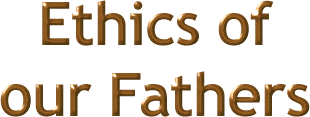Light Lines - Toldot
Parshat Toldot
4 Kislev 5760 / 13 November 1999
Ohr Somayach Home Page
There’s an old adage which runs: Don’t throw out the baby with the bath water. Meaning, don’t confuse the essential with the subordinate.
What does the Torah mean when it says "trapping" was in Esau’s mouth? Rashi explains that Esau knew how to trap with his mouth, to deceive. He asked his father how to tithe salt and straw, things which don’t require tithing. His father assumed from these questions that he was very pious.
Why did Esau choose to ask his question about salt and straw? Surely there were many other ways he could have paraded his "piety." Why specifically did he chose salt and straw?
All things are not created equal. Some things are of the essence, others are subordinate. Every palace has an entrance hall. No one would confuse the importance of the entrance hall with the palace itself. The palace is the essence. The entrance hall has importance only because it is the only way into the palace.
Similarly, this world is not the be-all-and-end-all of existence. This world is merely an entrance hall to a great palace of light — the world to come. The world to come is the essence. This world is subordinate to it. This world derives its importance only from the fact that it is the only access to the world to come. By itself, it has no value.
The spiritual is of the essence. The physical is subordinate to it. The physical is only significant to the extent that it provides a stage on which Man may grow in spiritual stature.
Jacob represents the spiritual. Esau, the physical. The relationship between Jacob and Esau was supposed to be that of essence and subordinate. As long as Jacob remains pre-eminent, the world can reach its fruition, and Esau himself, while being the incarnation of the physical, can also achieve spirituality by supporting Jacob. Esau, however, wasn’t satisfied with his role. He wanted to be the star of the show. He wanted to be the essence of Creation.
Esau betrayed his true intentions, to star in Creation, when he asked his father how one tithes salt and straw. Salt has no intrinsic nutritional value. It finds its value as a condiment to other foods. It is always subordinate. Straw, too, is subordinate to wheat. It is the vessel which carries the wheat, its support, its method of existence. But it is not the essence. The wheat is the essence. The Jewish People — the descendants of Jacob — are the "wheat of the world." The descendants of Esau are the "straw" — the means by which the Jewish People can fulfill their spiritual mission.
In the mind of Esau, however, straw and salt were of the essence. Thus, he could ask his father how to tithe them. Esau’s question betrayed his true intentions. Esau was trying to overturn the Divine order of Creation. Esau was trying to turn the bath water into the baby.
|
Ohr Somayach Home Page |
 Selections from classical Torah sources which express the special relationship between the People of Israel and Eretz Yisrael Eilat Eilat, the name of the most southerly settlement in Israel, appears several times in Tanach. It is mentioned as one of the encampments of Israel’s journey from Egypt to the Land of Israel. It appears as a geographical designation for the adjoining port of Etzion Gever where King Solomon’s navy carried on commerce with a neighboring country, and again in connection with King Yehoshafat’s ill-fated attempt to send ships to Ophir for gold. Modern Eilat serves as the country’s Red Sea port and has developed into a town with permanent residents. Its main claim to fame, however, is as a popular tourist attraction both for Israelis and visitors from abroad. |
Light Insight | Love of the Land | Ethics from our Fathers | Response Line Ohr Somayach Home Page |
A truly ‘rich’ person is not driven by his desire to acquire wealth. His need for physical and material prosperity takes its rightful place within the context of his whole life. Therefore he can dedicate himself primarily to spiritual matters, the fundamental endeavor of human life. As a result he will be blessed with richness both in this world and the next.
From this Mishnah, our Sages learn that "one who is content with the work of his hands is greater than one with the appropriate awe of Heaven", because King David in Psalms promises the former that ‘it will be well with you,’ while the latter is merely described as being ‘fortunate.’ Meaning to say, that even if a man is G-d fearing, so long as he lacks the capacity to be content with what he has and frantically pursues wealth he will not be able to properly devote himself to the service of G-d.
Light Insight | Love of the Land | Ethics from our Fathers | Response Line Ohr Somayach Home Page |
Xandra from Vermont wrote:
What is my obligation if I walk into or through a room where five people are engaged in lashon hara (derogatory speech) about another worker who is temporarily absent?
Dear Xandra,
It is a Torah prohibition to listen to derogatory speech. Therefore, if you have no business in the room at the time, then it is a mitzvah to leave. Joining the group or expressing interest in what is being said is prohibited. If you need to be in the room for some reason, then you have to try to listen to as little as possible, and try not to accept any of it as fact.
Certain leniencies apply to listening without the intent of accepting. Mainly, if you think some benefit may come out of it either for you — if for example, they are speaking about someone whom you are considering for a business partner — or, alternatively, if by listening you think that you will be able to rectify some wrong, then it may be permitted to listen. Here too, you’re only allowed to suspect that the information might be true in order to protect yourself, but you’re not allowed to believe it as fact.









